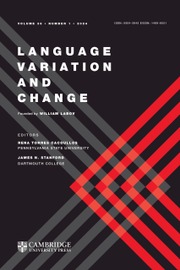Article contents
Remodeling the age variable: Number concord in Brazilian Portuguese
Published online by Cambridge University Press: 22 March 2013
Abstract
We analyze change in variable subject/verb and noun phrase concord in Rio de Janeiro Portuguese using trend samples from 1980 and 1999/2000. Plural marked forms exhibit increased frequency in this period, reversing earlier trends toward loss or stability in a development typical of flows and counterflows in the community. The directionality of most structural and social dimensions does not change, but age patterns shift. Our aim is to investigate how groups of speakers evolve over time. Comparison of same-age groups at different moments does not yield insight and is not conducive to apprehending patterns of evolution because speakers move from one age group to another. We set up age cohorts so as to sample virtually the same universes. Examining age cohorts, we see increased frequency of number concord, although the original pattern of relative usage is preserved. Speakers are on the move, but constrained by social patterns in which they are situated. The pattern is broken precisely by those who were not in it, the unborn in the 1980s, who reverse direction dramatically toward increased usage of concord.
- Type
- Research Article
- Information
- Copyright
- Copyright © Cambridge University Press 2013
References
REFERENCES
- 11
- Cited by


